“A woman, watching me work on a gate, told me point-blank that there is a good chance that I am a lesbian,” an ironworker confided to AyiboPost
Ostinvil Phydemazela still remembers times when some called her “Bayakou” (drain girl) because she had chosen plumbing as a profession.
Originally from Vallières in the south-east, the woman is constantly reproached by members of her family, who are very upset by her « dirty profession, which doesn’t fit in with her beauty, » Phydemazela tells AyiboPost.
A plumber since 2016, Phydemazela joins the ranks of Haitian women who work in professions where they are historically underrepresented. In doing so, these pioneers are leading the way by example. They also encounter resistance.
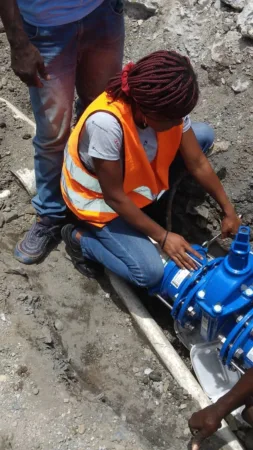
Ostinvil Phydemazela, working as a plumber in Jakzi, Cap-Haïtien, in September 2023.
Phydemazela discovered an interest in plumbing in early childhood.
“Raised in the countryside, I was used to using very dilapidated and unclean toilets,” says Phydemazela. “I thought, she said, of learning plumbing so I could have modern, clean toilets at home.”
Learning the trade at Village SOS, a vocational training center located in Cap-Haitien, took two long years.
But despite her efforts, Phydemazela often faces a lack of trust from her male colleagues who, she says, question her work.
“It’s very annoying,” storms the professional who, since 2021, has provided her services as a plumber to the National Directorate of Drinking Water and Sanitation (DINEPA).
Read also: Haitian Lawyers subject to gender discrimination and abuse within the Judicial System
Her family’s disapproval often arises in these situations.
Alberline Saint-Jean, 24 years old and a mechanic, had to defy her father who wanted “a more decent profession” for his daughter.
A mechanic himself, the man refused to pay the required tuition at the Professional School of Gonaïves (EPG). Had it not been for financial support from her mother, Saint-Jean would not have been able to pursue her vocation.
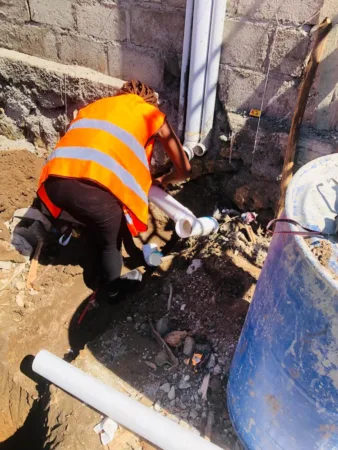
Ostinvil Phydemazela, working as a plumber in Jakzi in Cap-Haïtien in September 2023.
Jean Medunji Liamell, living in Gonaïves, experiences a similar situation. A mechanic, the young woman faces “bursts of laughter at her former congregational school” and hurtful remarks at her workplace, because of her profession.
“One day, a policeman who came to have his car repaired at work insisted on financing my studies at any cosmetology school in the area,” says Jean Medunji Liamell, her voice foggy.
These inappropriate comments test the motivation of women working in professions considered the sole preserve of men.
Read also: A veritable struggle for woman photographers in Haiti
Marceille Merloude, an ironworker specializing in electric welding, has gotten one too many. Last year, in her workshop in Trou du Nord, “a woman, watching me work on a gate, told me point-blank that there is a good chance that I am a lesbian.”
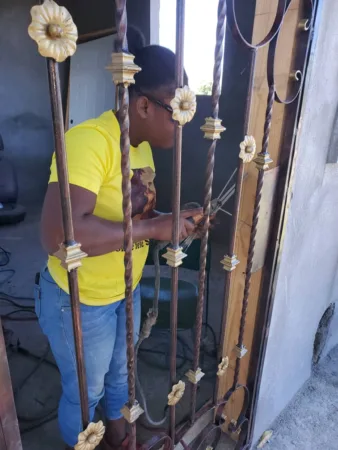
In the workshop where she works in Trou du Nord, the female ironworker specializing in electric welding, Marceille Merloude, is welding an iron gate.
For her part, Stécy Augustin, an electrician, still remembers a Dominican team leader who did not want to enlist her because she was a woman, in May 2021.
“It was only after a heated discussion with another Haitian team leader that I was selected,” confides Augustin, who studied electricity between 2013 and 2015 after obtaining a scholarship from the vocational school of the Holy Spirit in Cap-Haitien.
The only woman among nearly ten male laborers, her pay gives her independence and freedom.
“I make between 15,000 and 20,000 gourdes per month,” underlines Augustin, according to whom “the fear of getting dirty and the criticism that targets women like them are important factors that explain the over-representation of men in certain professions.”
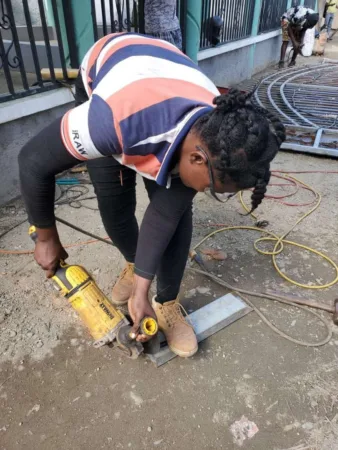
The blacksmith specializing in electric welding, Marceille Merloude, is currently welding iron in the workshop where she works in Trou du Nord.
Tamas Jean Pierre, sociologist and feminist activist, agrees. “Mockery, sexist remarks, among others,” are all means used to perpetuate “the sexual division of labor, a material element that organizes the patriarchal social system [at work in Haiti].”
Read also: Perspective | Why so few women in the press in Haiti?
This professional apartheid even extends to the country’s universities.
Yodlène Bazelais, 23, is one of two women admitted directly out of 28 men into the mathematics department at the École Normale Supérieure (ENS) of the State University of Haiti (UEH) in 2021.
Integration, according to Bazelais, was not easy. The other woman, admitted directly like her, abandoned these studies.
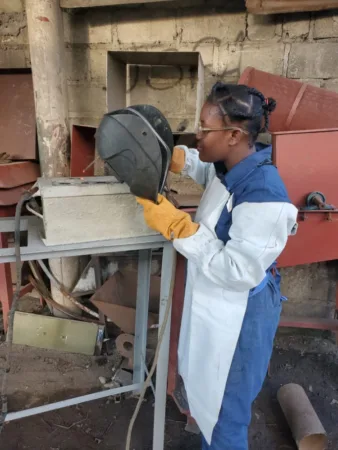
Marceille Merloude, a specialized welder, is currently welding iron in the workshop where she works in Trou du Nord.
“I am often ignored in classes, and the calls for solving math problems made by teachers are usually aimed at men,” laments Bazelais. “I sometimes feel like a fish out of water,” says the mathematics teacher at two schools in the metropolitan area.
At the ENS, over the last three years, there have been 5 women out of 80 applicants admitted directly to the mathematics department, or 6.25% of admissions.
In the physics department, there have only been 7 women admitted out of 81 directly admitted applicants, or 8.64% of admissions over the last three years.
I am often ignored in classes, and calls from teachers to solve math problems are usually aimed at men.
A pseudoscience that makes women unfit for certain professions often comes up in “sexist” arguments.
Slender and of slight build, Malaïca Jean-Baptiste works in building construction in Petit-Anse.
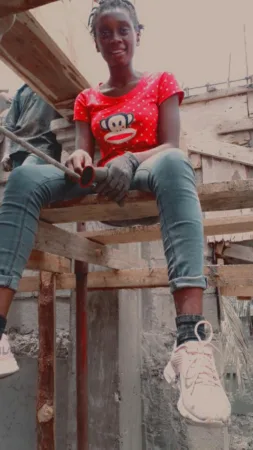
Malaïca Jean-Baptiste works as a mason and ironworker on a construction site in Petit-Anse.
“Many of those close to me let me understand that this manual profession belongs to men, that it is not suitable for a person as frail as me and that I might not have children,” says the mason and ironworker in her twenties.
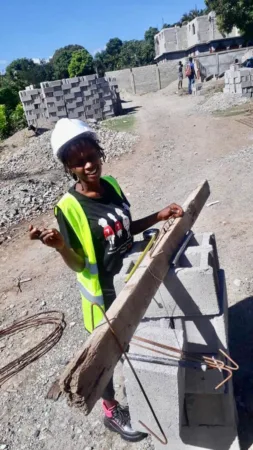
As a mason and ironworker, Malaïca Jean-Baptiste works on a construction site in Petit-Anse.
According to Dr. Grégory Beaugé, gynecologist, there are professions where both sexes are exposed to potentially dangerous chemicals such as benzene or arsenic. High-level athletic activities can also create imbalances that can affect women’s fertility.
“But, according to the specialist, there is no study which proves that women who work in the professions cited in this article may not be fertile.”
English translation by Sarah Jean.
Cover image edited by AyiboPost showing women in Haiti working in professions often associated with men.
Gardez contact avec AyiboPost via :
► Notre canal Telegram : cliquez ici
► Notre Channel WhatsApp : cliquez ici
► Notre Communauté WhatsApp : cliquez ici







Comments